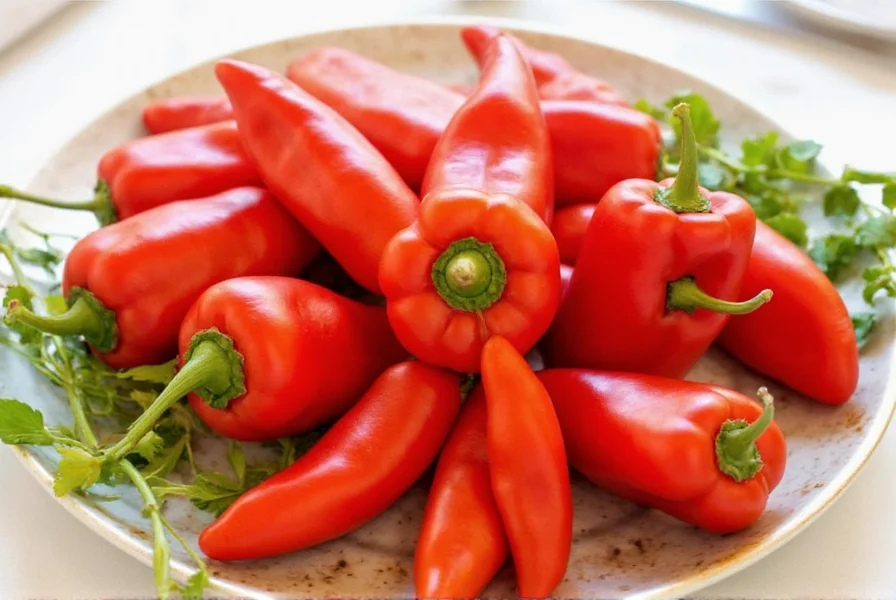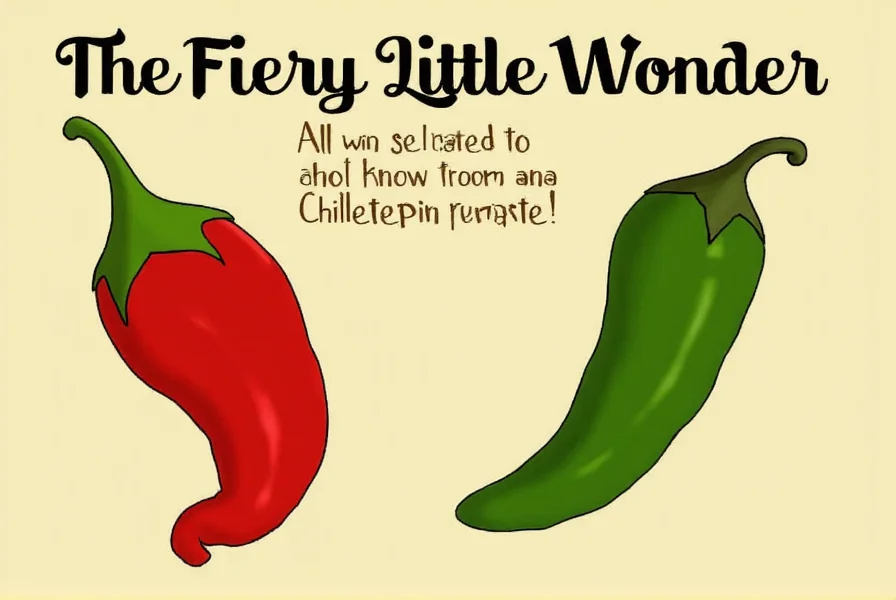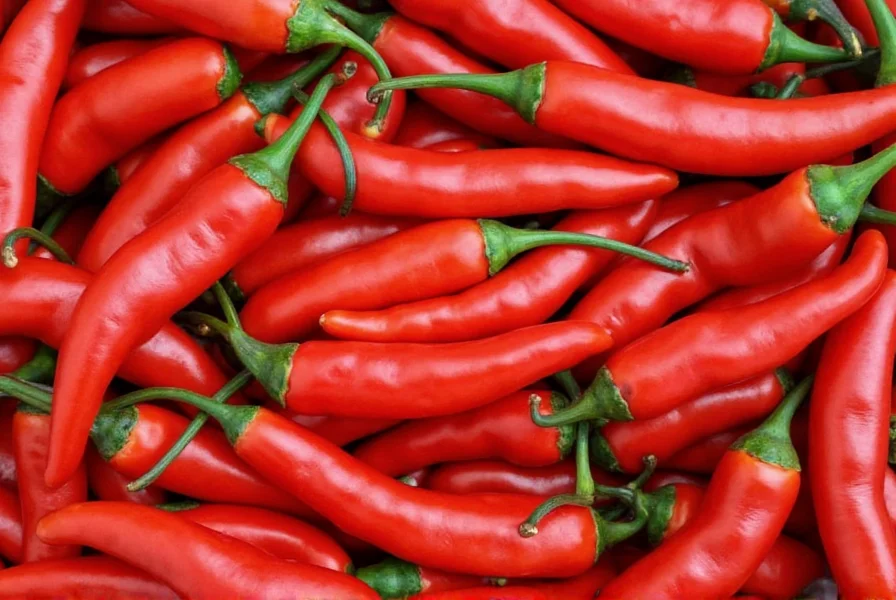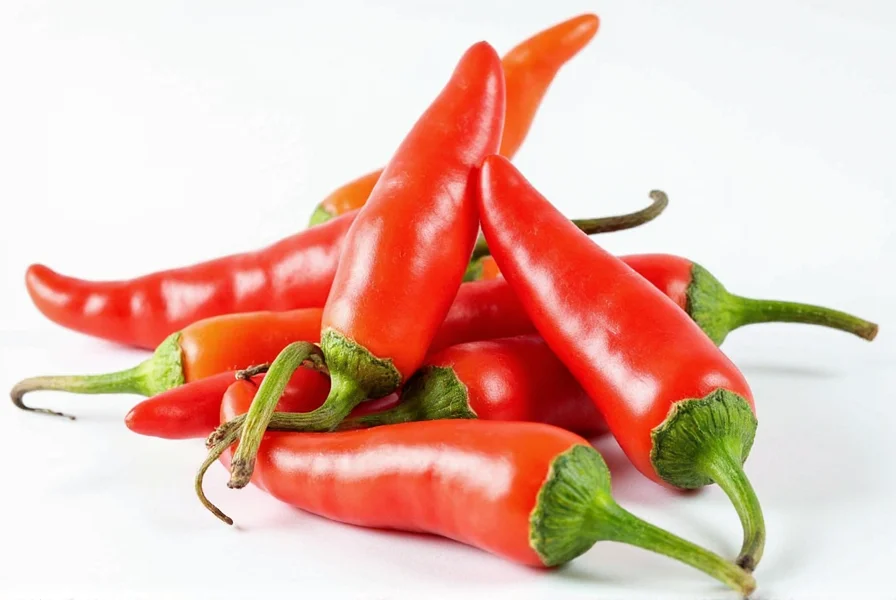The chiltepin pepper has a Scoville Heat Unit (SHU) rating of 50,000–100,000, making it one of the hottest wild chili peppers. This small but potent pepper is up to 20 times hotter than a jalapeño and delivers a unique fruity, smoky flavor alongside its intense heat.
| Pepper Type | Scoville Units (SHU) |
|---|---|
| Bell Pepper | 0 |
| Jalapeño | 2,500 – 8,000 |
| Hatch Green Chile | 1,000 – 30,000 |
| Chiltepin | 50,000 – 100,000 |
| Habanero | 100,000 – 350,000 |
| Carolina Reaper | 1,400,000 – 2,200,000 |
What Is Chiltepin Pepper?
The chiltepin pepper, also known as the 'mother of all peppers,' is a wild chili native to the southwestern United States and northern Mexico. Unlike its domesticated cousins, the chiltepin grows naturally in desert climates and is often harvested by hand.
Its size? Think about a pea — small, round, and packing a punch! These little guys are usually green when unripe but turn red, orange, or even yellow as they mature.

Scoville Scale Basics
To understand how spicy the chiltepin is, let's take a quick detour into the Scoville Scale. Created by pharmacist Wilbur Scoville in 1912, this scale measures the amount of capsaicin — the compound responsible for spiciness — in any given chili pepper.
Why Is It So Hot?
You might be wondering — why such a tiny pepper packs so much heat? Well, here's the science behind it:
- Concentration of Capsaicin: Because the chiltepin is small, its capsaicin is more concentrated per unit volume.
- Wild Growth: Being a wild plant, it hasn't been selectively bred for mildness like many domestic peppers have.
- Climate Influence: The harsh desert environments it grows in may increase its potency as a natural defense mechanism.
How to Use Chiltepin Peppers in Cooking
Using chiltepin peppers is not just about the heat — it's also about flavor. These peppers bring a fruity, smoky depth along with their searing spice. Here are some popular ways to use them:
- Salsas & Sauces: Add crushed dried chiltepines to salsas or hot sauces for an intense kick.
- Dried & Ground: Grind into a fine powder and sprinkle over tacos, grilled meats, or soups.
- Pickled: Pickled chiltepines make a fiery garnish for cocktails, salads, or antojitos mexicanos.
- Oils & Vinegars: Infuse vinegar or oil with dried chiltepines for a flavorful pantry staple.
- Smoked Chiltepines: Smoked versions add a rich, earthy note along with the heat — perfect for barbecue rubs.

Where to Buy Chiltepin Peppers
Finding fresh chiltepin peppers might be a bit tricky unless you live in the Southwest or northern Mexico. However, there are several places where you can buy both fresh and dried versions:
- Local Farmers Markets: Especially during late summer and early fall in Arizona, New Mexico, and Texas.
- E-commerce Stores: Amazon, Etsy, and specialty spice shops offer dried chiltepin peppers and powders.
- Mexican Grocery Stores: Look for jars of pickled chiltepines or dried pods in the spice aisle.
- Gardening Stores: Some nurseries sell seeds if you want to grow your own!
| Product Type | Features | Advantages | Use Cases | Target Audience | Best For |
|---|---|---|---|---|---|
| Fresh Chiltepin Pods | Ripe or green, usually found seasonally | Strongest flavor, ideal for pickling | Pickling, roasting, infusing | Chefs, DIYers, fermenters | Those who enjoy hands-on cooking |
| Dried Whole Pods | Dehydrated, long shelf life | Easy to store, great for grinding | Spice blends, stews, moles | Home cooks, Mexican cuisine lovers | Adding authentic heat to dishes |
| Chiltepin Powder | Ground from dried pods | Convenient, no prep needed | Seasoning, finishing touch | Busy cooks, grillers, snack lovers | Quick heat boost in meals |
| Pickled Chiltepines | Preserved in brine or vinegar | Ready to eat, tangy kick | Tacos, cocktails, charcuterie | Appetizer fans, cocktail enthusiasts | Flavorful, eye-catching garnish |
| Chiltepin Seeds | Live plants available via seed | Grow your own, sustainable | Gardening, education, sustainability | Gardeners, homesteaders, educators | Experiential growing projects |
Safety Tips When Handling Chiltepin Peppers
These little guys may look innocent, but don't be fooled — handling them can leave your fingers burning (literally!). Here are some safety tips to keep in mind:
- Wear Gloves: Capsaicin is oily and sticks to skin easily. Disposable gloves are your best friend.
- Avoid Touching Face: No matter how tempting, avoid touching your eyes, nose, or mouth while working with these peppers.
- Ventilate Your Kitchen: Cutting up chiltepines can release fumes that irritate the eyes and throat.
- Use Milk or Oil: If you get burned, dairy or oils (like olive oil) help neutralize capsaicin better than water.
- Store Safely: Keep dried pods in airtight containers away from moisture and sunlight.

Frequently Asked Questions
How hot is a chiltepin pepper on the Scoville scale?
Chiltepin peppers range from 50,000 to 100,000 Scoville Heat Units (SHU). This makes them significantly hotter than jalapeños (2,500-8,000 SHU) but milder than habaneros (100,000-350,000 SHU). At their maximum heat, chiltepines can be up to 20 times hotter than a jalapeño.
How does the chiltepin pepper compare to other common peppers?
On the Scoville scale, chiltepin peppers fall between jalapeños and habaneros in terms of heat. They're hotter than serranos and cayenne peppers but not as extreme as ghost peppers or Carolina Reapers. What makes chiltepines unique is their combination of intense heat with fruity, smoky flavor notes that many hotter peppers lack.
Why are chiltepin peppers so much hotter than other small peppers?
Chiltepin peppers are exceptionally hot due to their small size (which concentrates the capsaicin), their wild nature (not bred for mildness), and their desert habitat (which may increase potency as a defense mechanism). Unlike domesticated peppers that have been selectively bred over time, chiltepines maintain their natural, intense heat level.
Can I grow chiltepin peppers at home?
Yes, but it can be challenging. Chiltepin peppers thrive in hot, arid climates similar to their native southwestern US and northern Mexico habitat. They require well-draining soil, plenty of sunlight, and careful watering. Many gardeners successfully grow them in containers that can be moved indoors during colder months. Seeds can be found at specialty gardening stores or online.
What's the best way to handle chiltepin peppers safely?
Always wear gloves when handling chiltepin peppers, as their high capsaicin content can cause severe skin irritation. Avoid touching your face, especially eyes, during and after handling. Work in a well-ventilated area as the capsaicin fumes can irritate your respiratory system. If you get burned, use milk or oil (not water) to neutralize the capsaicin on your skin.
Conclusion
Whether you're looking to spice up your kitchen game or explore the world of wild peppers, the chiltepin pepper Scoville rating proves that good things really do come in small packages. From its bold flavor to its explosive heat, the chiltepin is a must-have for adventurous eaters and spice connoisseurs alike.
Now that you know how hot it is and how to use it, go ahead and grab a jar of pickled chiltepines or a bottle of powder — your next dish deserves that fiery upgrade!

Stay spicy, friends!











 浙公网安备
33010002000092号
浙公网安备
33010002000092号 浙B2-20120091-4
浙B2-20120091-4